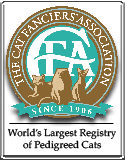
|
|

Maine Coon Cat Health Report
Some highlights from the AAFP Fall meeting in Chicago November 2005. The
conference covered primary and secondary causes of gastrointestinal
disease.
Dr. David C. Twedt, Dilpl. ACVIM
Hepatic Lipidosis - Cats may be slow to show evidence of hepatocellular
damage in elevated ALT and AST levels so pay attention to other hepatic
values like bilirubin, bile acid tests, ALP and GGT values. Ultrasound
and biopsy (not fine needle aspirates) will help confirm the diagnosis.
- Treatment - Feeding is imperative. Via a nasogastric tube,
esophagostomy tube or peg tube. Do not hesistate to get nutrition into
these cats. IV fluid therapy - Normosol or NaCl with 2.5% Dextrose.
These cats often have increased lactic acid levels and are glucose
intolerant so avoid lactated ringers solution and high dextrose
containing fluids. Other supplements may include Vit B12, potassium,
phosphorus, Vit E, SAM-e (Denosyl brand) and Silibin (Marin). Other
supplements have been recommended but there is no literature to support
their use.
Dr. Keith Richter, Dipl ACVIM
GI Lymphoma - Great caution must be used in interpreting biopsy samples.
Be sure to choose a pathologist that has experience in grading lymphoma
and send numerous biosy samples for comparison. Lymphoma and
inflammatory bowel disease can look very similar.
Gastric Ulceration - Cats have poor esophageal clearance of tablets with
a dry swollow so give meds with water or in a liquid. Neoplasia is a
common cause of GI ulceration in cats.
Abdominal pain - Can have a devastating affect on patient's recovery and
cats give subtle signs of pain so pay attention and treat their pain.
Dr. Jorg M. Steiner, phD, Dipl ACVIM, Dipl ECVIM-CA
Chronic Diarrhea - A thorough work-up including chemistry, CBC,
urinalysis, Felv/FIV testing, T4(esp in middle aged to older cats) and
fecal flotation with zinc sulfate and a direct smear.
- A broad spectrum anthelmintic is recommended no matter what the
results.
- More advanced work-up - Function Tests - TLI for exocrive function and
PLI for pancreatitis
- Tritrichomonas foetus culture pouch - common cause of diarrhea in
cattery cats
- Fecal culture especially if there is blood in the stool
- Serum Cobalamin and folate levels
- Deteriorating patients may need endoscopy and/or ultrasound
- Dietary Trails with a hypoallergenic diet are another tool to ruleout
dietary intolerance and hypersensitivity.
I would also like to make sure everyone is aware that the SMA testing is
now available at MSU through Dr. Fyfe's lab. You can contact them by one
of the following routes to get testing supplies and instructions.
fyfe@cvm.msu.edu
Phone (517) 355-6463
Fax (517) 353-8957
Laboratory of Comparative Medical Genetics
2209 Biomedical Physical Sciences
Michigan State University
East Lansing, MI 48824-4320
Thank you,
Nan
National Winners | Regional Winners | Distinguished Merit | Best of Breed
Health Issues | Color Prefix and Class | Breed Booth | Membership Banners | News
Web content: Trudie Allen, CFA Maine Coon Cat Breed Council
Web content copyright © 2015, this website. Photographs are copyrighted by the individual photographer.